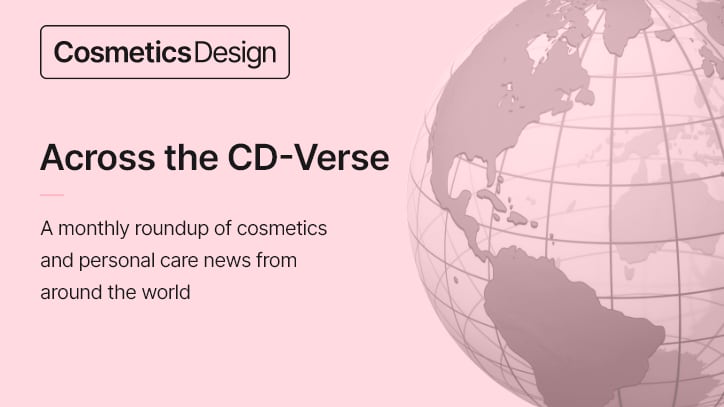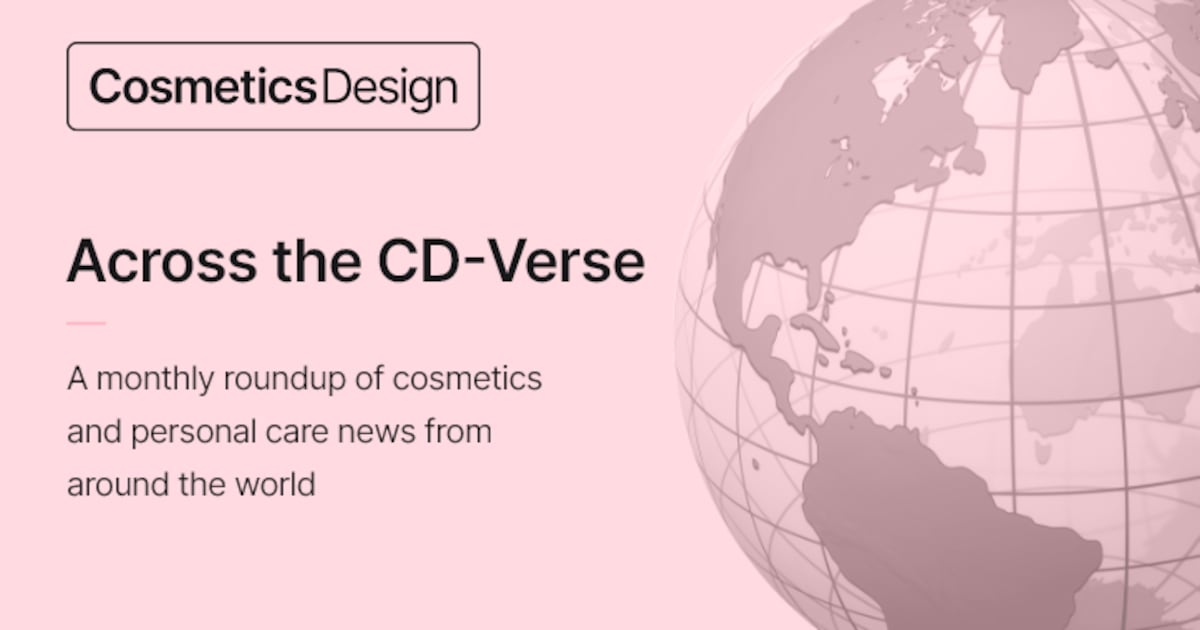
Throughout the month of April, we tracked how new US tariffs ould shake up global supply chains, spotlighted emerging research with implications for product development, and covered key business moves throughout the beauty and personal care sectors.
From insights into Unilever and L’Oréal China’s market financials to studies on infant paraben exposure through lotion use and peony callus extracts’ impact on UVB damage to exciting product launches from DTC-brand Brotege and Skinceuticals, here is this month’s Across the CD-Verse roundup.
CosmeticsDesign APAC
Kolmar Korea’s new stabilisation technology overcomes challenges of hybrid sunscreen
Cosmetics ODM company Kolmar Korea has unveiled a new sunscreen technology that overcomes formulation challenges by integrating the strong ultraviolet (UV) protection of inorganic sunscreens with the superior spreadability of organic sunscreens.
Kolmar Korea announced on March 25 that it has developed the world’s first hybrid composite sunscreen stabilization technology, which encapsulates inorganic sunscreen particles with organic sunscreen components.
This innovation, called UV-DUO PLUS, addresses the shortcomings of traditional hybrid sunscreens, where particle aggregation often led to gaps in the UV protection film.
New tree peony callus extract shows potential to protect skin from UVB damage: China study
An extract made from the callus of the rare tree peony (Paeonia suffruticosa) may offer significant protection against UVB-induced skin damage, according to recent study conducted in China.
Using both human and laboratory studies, researchers at Peking University, MCL Skincare and Hangzhou Shiguang Xinya Biotechnology sought to find out if peony callus extract (PCE) could not only soothe skin inflammation caused by UVB radiation, but also help repair DNA damage and reduce signs of skin ageing.
L’Oréal China to bolster consumer-centric approach, invest in emerging C-beauty brands
The company recently held its 2024/2025 Annual Results Press Meeting, where its strategies for strengthening growth in the Chinese market were highlighted.
“L’Oréal’s purpose of creating beauty aligns with Chinese consumers’ growing aspiration of a better life. We firmly believe that investing in China is investing in the future.
“With a long-term commitment, we will continue to deepen our presence in China, seizing opportunities from the beauty industry’s socio-economic impact, enhancing our proximity to Chinese consumers, and elevating the game with strategic investments,” said Vincent Boinay, President of L’Oréal North Asia Zone and CEO of L’Oréal China.
Amid global economic uncertainties, Boinay reaffirmed L’Oréal’s confidence in China’s cosmetics market, driven by beauty’s stronger-than-ever relevance to the Chinese society.
SkinCeuticals enters Singapore’s travel retail, debuts anti-ageing face cream
Through its retail presence at The Shilla Duty Free store in Singapore Changi Airport Terminal 1 and e-commerce platform iShopChangi, the brand provides access to professional-grade skin care for travelers to experience the same level of care as their beauty routines at home.
According to SkinCeuticals, this launch is more than just a brand expansion. It signals a fundamental shift in the way travelers engage with beauty and skin care while on the move.
Tariff crisis: Initial disruptions significant, but recovery tends to be swift – analyst
While the recently announced US tariffs will pose notable challenges for both Chinese exporters and American cosmetics firms operating in China, they may catalyze important shifts in strategy, competitiveness, and consumer preference, according to Hedy He, Regulatory Analyst at ChemLinked.
She was speaking to CosmeticsDesign-Asia on the implications of rising trade barriers.
“Some Chinese beauty companies are strengthening their overseas footprint. For instance, COSMOS Personal Care has invested in a sunscreen manufacturing facility in Malaysia, while Florasis has expanded into France and Japan. These strategic moves help avoid tariffs and leverage local free trade agreements to reduce logistics costs,” she said.
CosmeticsDesign EMEA
One-in-five Brits don’t wash their face before bed, says new Kenvue survey
Kenvue, which owns brand such as Aveeno, Neutrogena and Piz Buin, has shared the results of its new research into the beauty and personal care routines of people in the UK.
The manufacturer partnered with Censuswide to undertake a nationwide survey of 2,000 people aged 18+, which revealed that 60% of British people lacked a consistent skin care routine.
It also highlighted that 34% of those surveyed spend five minutes or less on their daily skin care routine and on average, and Brits go to bed without washing their face twice a week.
French cosmetics industry responds to US import tariffs
France has long been the world’s biggest exporter of cosmetics and personal care products, and in 2024 most of the exports (40%) went to other European countries, accruing around €10bn, according to the French cosmetics trade association FEBEA (La Fédération des Entreprises de la Beauté.)
The trade association said it was disappointed that the US administration has decided to introduce an additional 20% customs duty on imports of goods from the European Union.
“This measure will necessarily have an impact on the French cosmetics industry,” it said, and highlighted that the US accounts for 13% of the sector’s exports and “is thus a major trading partner for French beauty companies.”
14 disruptive beauty & personal care innovations that have just landed
InCosmetics Global is the world’s largest cosmetics ingredients show and a linchpin for the future of new product development (NPD) in beauty and personal care.
In this CDE article, we rounded up some ingredient innovations that caught our eye at this year’s show.
Beauty, wellbeing & personal care sales continue to outstrip food & home care for Unilever
Between 1 January and 31 March, Unilever’s overall sales dipped 0.9% to €14.8bn, but grew 3% on an underlying basis.
“We are conscious that the macroeconomic environment, currency stability and consumer sentiment remain uncertain and we will be agile in adjusting our plans as necessary,” said CEO Fernando Fernandez when discussing the sales results.
EU warns shoppers to avoid cheap cosmetics from ecommerce sites
When presenting an annual report in Brussels, EU Commissioner Michael McGrath revealed that the EU has received more than 4,137 alerts for dangerous products over the past year – the highest number since its reporting system was implemented in 2003.
A key driver behind this surge appeared to be the growing volume of goods imported from China, with 40% of the alerts being on goods that originated there.
Cosmetics were the most flagged items – accounting for 36 per cent of all alerts, followed by toys (15%), electrical appliances (10%), motor vehicles (9%) and chemical products (6%).
An incredible 97% of the flagged cosmetics were found to contain BMHCA – a synthetic fragrance linked to reproductive harm and skin irritation that is banned from use in the EU.
CosmeticsDesign Americas
Study links infant lotion use to paraben exposure
A recent biomonitoring study, published in the Journal of Exposure Science and Environmental Epidemiology, has found that lotion use is a strong predictor of paraben exposure in young infants, raising new concerns about the safety of personal care products for this vulnerable population.
The study, characterized by its authors as the “first paper to report paraben levels and evaluate predictors of exposure in infants,” analyzed urinary biomarkers in infants at one to three months and again at 12 months to assess paraben levels and identify potential sources of exposure.
In response to the study’s findings, Dr. Barbara Olioso, founder of the sustainable product finder technology Green Chem Finder, emphasized the implications for cosmetic product development. “I welcome this study as it can potentially impact the way ingredient safety is evaluated, especially in infants’ skin,” she said.
Beauty brands face tough choices as tariffs drive up costs
Current and impending tariffs are squeezing margins for US cosmetics and personal care brands, but industry stakeholders have options to respond proactively, Kimber Maderazzo from the Pepperdine Graziadio Business School told CosmeticsDesign.
Maderazzo, a professor of Marketing at Pepperdine Graziadio Business School, shared her expert insights into the current effects of the Trump administration’s tariff war and how industry stakeholders can take an anticipatory position in the weeks and months ahead.
LYS Beauty secures eight-figure Series A investment amid market headwinds
“The first Black-owned clean makeup brand to launch in Sephora,” according to the company’s press release, has closed its latest investment round led by Encore Consumer Capital.
The funding comes at a time when many early-stage beauty companies face tightening capital and broader pullbacks in DEI-related initiatives, including the Trump administration’s rollbacks earlier this year. “With this milestone, founder and CEO Tisha Thompson joins the two percent of exclusively female-founded startups who have successfully raised funding,” the PR continued.
CosmeticsDesign spoke to Thompson for her insights into the investment and the company’s growth and expansion strategies.
‘Bros, not pros’: Brotege banks on minimalism to win over skin care-skeptical men
Direct-to-consumer brand Brotege’s launch is focused on addressing on what founder Saporta perceives as a persistent gap in men’s skin care. While the global men’s skin care market is projected to reach $24.5 billion by 2030, according to Grand View Research, a significant portion of male consumers remains underserved, particularly those seeking simplicity over specialization.
In fact, nearly half of the men in the US do not use facial skincare products at all, according to a 2023 report from Mintel. The report cites cost, complexity, and a lack of relevance in product messaging as key barriers.
Saporta is targeting this overlooked demographic with Brotege, a brand built around a single, all-in-one product. “Almost half of all men don’t even own a simple face moisturizer,” he told CosmeticsDesign. “There’s a huge segment of the population being overlooked—they just want something simple, effective, and affordable.”
Legal expert reacts to California’s proposed retinol/AHA ban for under 18s
A California bill that would prohibit the sale of over-the-counter retinol and alpha hydroxy acid (AHA) skin care products to children under 18 is moving forward.
Industry stakeholders may recall that a nearly identical version of the bill introduced in 2023 failed to advance out of committee. As previously reported by CosmeticsDesign, at the time, critics raised similar concerns about the lack of clarity and the bill’s potential to create confusion among consumers and compliance burdens for sellers.
While the legislation is framed as a public health measure, the bill’s language has left manufacturers and retailers with unanswered questions about how to comply.

